Related Research Articles

"In Flanders Fields" is a war poem in the form of a rondeau, written during the First World War by Canadian physician Lieutenant-Colonel John McCrae. He was inspired to write it on May 3, 1915, after presiding over the funeral of friend and fellow soldier Lieutenant Alexis Helmer, who died in the Second Battle of Ypres. According to legend, fellow soldiers retrieved the poem after McCrae, initially dissatisfied with his work, discarded it. "In Flanders Fields" was first published on December 8 of that year in the London magazine Punch. Flanders Fields is a common English name of the World War I battlefields in Belgium and France.

Poperinge is a city and municipality located in the Belgian province of West Flanders, Flemish Region, and has a history going back to medieval times. The municipality comprises the town of Poperinge proper and surrounding villages. The area is famous for its hops and lace.
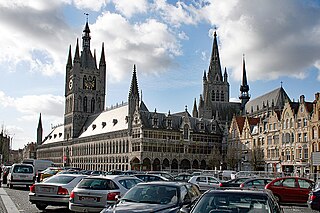
Ypres is a Belgian city and municipality in the province of West Flanders. Though the Dutch name Ieper is the official one, the city's French name Ypres is most commonly used in English. The municipality comprises the city of Ypres/Ieper and the villages of Boezinge, Brielen, Dikkebus, Elverdinge, Hollebeke, Sint-Jan, Vlamertinge, Voormezele, Zillebeke, and Zuidschote. Together, they are home to about 34,900 inhabitants.
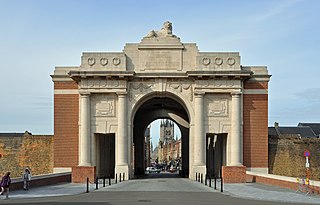
The Menin Gate, officially the Menin Gate Memorial to the Missing, is a war memorial in Ypres, Belgium, dedicated to the British and Commonwealth soldiers who were killed in the Ypres Salient of World War I and whose graves are unknown. The memorial is located at the eastern exit of the town and marks the starting point for one of the main roads that led Allied soldiers to the front line.
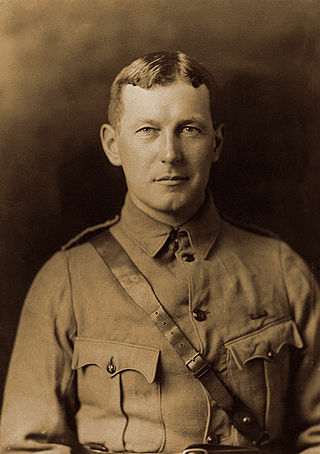
Lieutenant-Colonel John McCrae was a Canadian poet, physician, author, artist and soldier during the World War I and a surgeon during the Second Battle of Ypres, in Belgium. He is best known for writing the famous war memorial poem "In Flanders Fields". McCrae died of pneumonia near the end of the war. His famous poem is a threnody, a genre of lament.

Lier is a municipality located in the Belgian province of Antwerp. It is composed of the city of Lier proper and the village of Koningshooikt. The city centre is surrounded by the river Nete, around which it grew. In 2018, Lier had a total population of 35,712. The total area is 49.70 km2 making a population density (PD) of 720 per km2. Lier is known for its beers, its patron saint St. Gummarus and Lierse vlaaikes cake. It is also home to the world headquarters of Van Hool, a global bus and coach manufacturer. Lier's two principal football clubs are K. Lyra-Lierse and Lierse Kempenzonen.
"The Unquiet Grave" is an Irish / English folk song in which a young man's grief over the death of his true love is so deep that it disturbs her eternal sleep. It was collected in 1868 by Francis James Child as Child Ballad number 78. One of the more common tunes used for the ballad is the same as that used for the English ballad "Dives and Lazarus" and the Irish pub favorite "Star of the County Down".
Private Thomas James Highgate was a British soldier during the First World War and the first British soldier to be convicted of desertion and executed by firing squad on the Western Front. He was born in Shoreham, Kent, and worked as a farm labourer before joining the army in 1913 as a seaman. When the First World War began, he fought with the First Battalion of the Royal West Kents. Highgate was executed 35 days into the war, on 8 September 1914, after being found hiding in a farmhouse wearing civilian clothes. His death was made as public as possible and used as an example to other soldiers. Highgate's name was not included on the war memorial at Shoreham; from the late 1990s onwards, some local residents fought for his name to be added whilst others disagreed. Posthumous pardons for soldiers who had been executed, including Highgate, were announced in 2006.
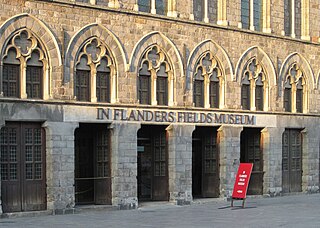
The In Flanders Fields Museum is a museum in Ypres (Ieper), Belgium, dedicated to the study of the First World War. It occupies the second floor of the Cloth Hall (Lakenhalle) on the market square in the city centre. The building was largely destroyed by artillery during the war, but was afterwards reconstructed. In 1998 the original Ypres Salient Memorial Museum was refurbished and renamed In Flanders Fields Museum after the famous poem by Canadian John McCrae. Following a period of closure, the museum reopened on 11 June 2012. The curator, Piet Chielens, is a World War I historian.
Julian Putkowski is a British university teacher, military historian, researcher, and broadcaster. He has written extensively on military executions in World War I.
Brian James Bond is a British military historian and professor emeritus of military history at King's College London.
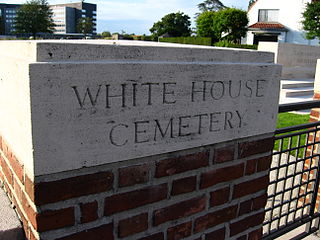
White House Cemetery is a Commonwealth War Graves Commission (CWGC) burial ground for the dead of the First World War located in the Ypres Salient on the Western Front in Belgium.
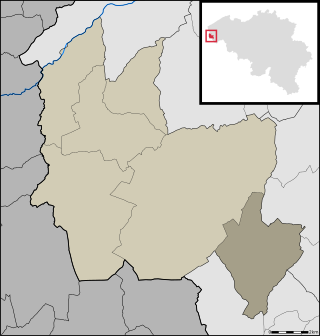
Reningelst is a rural village in the Belgian province of West Flanders, and a "deelgemeente" of the municipality Poperinge. The village has about 1405 inhabitants.

Wang Jungzhi was a Chinese labourer, who was one of the last people to be executed by the British Army during the First World War. He was convicted of murder and executed by firing squad on 8 May 1919, six months after the Armistice.

Piet Huysentruyt is a Belgian TV chef and the author of five bestselling cooking books.

Nicholas J. Saunders is a British academic archaeologist and anthropologist. He was educated at the universities of Sheffield, Cambridge, and Southampton. He has held teaching and research positions at the National Autonomous University of Mexico, the University of the West Indies, Dumbarton Oaks, Washington D.C., and at University College London, where he was Reader in Material Culture, and undertook a major British Academy sponsored investigation into the material culture anthropology of the First World War (1998–2004). As of 2014 Saunders was Professor in the Department of Anthropology and Archaeology at the University of Bristol, where he was responsible for the MA programmes in historical archaeology and conflict archaeology. As of 2018, he is Emeritus Professor of Material Culture in that department. He is a prominent contributor to the nascent field of conflict archaeology, and has authored and edited numerous academic publications in the field. In addition to his research specialising in the anthropology of 20th-century conflicts and the archaeology of World War I theatres in Belgium, France and the Middle East, Saunders has also conducted extensive fieldwork and research in pre-Columbian and historical archaeology of the Americas. He has been involved with major museum exhibitions in London, Ypres (Belgium), Tübingen (Germany), and at the Centre Pompidou-Metz (France). Saunders has investigated and published on material cultures and landscapes of Mesoamerica, South America, and the Caribbean. His most recent research has been on the aesthetics of brilliance and colour in indigenous Amerindian symbolism, an extensive survey investigation of the Nazca Lines in Peru, the anthropological archaeology of twentieth-century conflict and its legacies along the Soca (Isonzo) Front on the Slovenian-Italian border, and the conflict artworks of the Chinese Labour Corps on the Western Front during and after the First World War.

The Flanders Fields Memorial Garden is a monument dedicated to the participants of World War I situated alongside the Guards Chapel at Wellington Barracks in Central London, England.
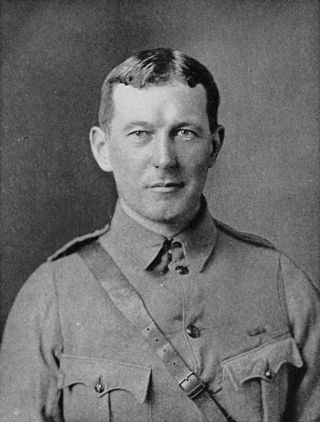
Site John McCrae is a World War I memorial site near Ypres, Belgium. It is named after the Canadian physician Lieutenant Colonel John McCrae, MD (1872–1918), author of the famous poem "In Flanders Fields", which he composed while serving at this site in 1915.